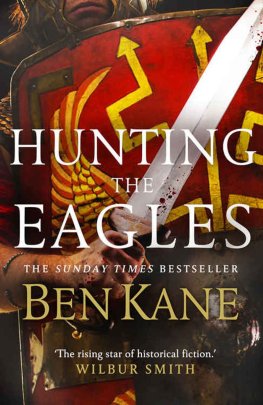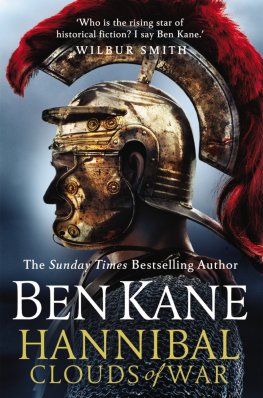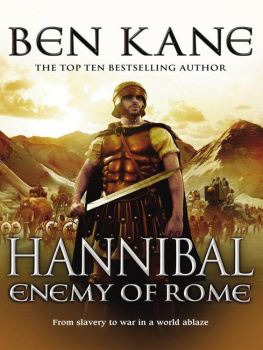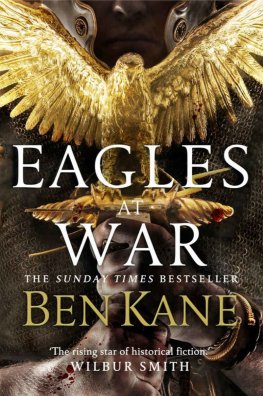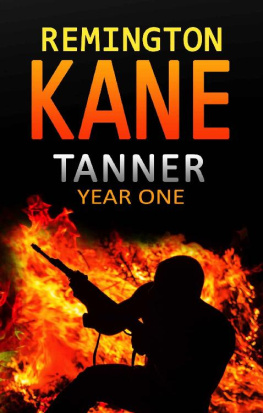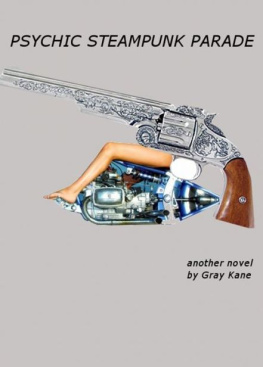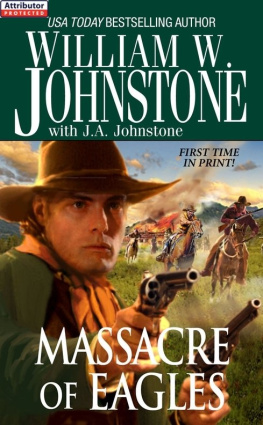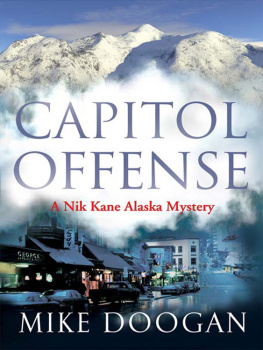Ben Kane - Hunting the Eagles
Here you can read online Ben Kane - Hunting the Eagles full text of the book (entire story) in english for free. Download pdf and epub, get meaning, cover and reviews about this ebook. year: 2016, publisher: Random House, genre: Adventure. Description of the work, (preface) as well as reviews are available. Best literature library LitArk.com created for fans of good reading and offers a wide selection of genres:
Romance novel
Science fiction
Adventure
Detective
Science
History
Home and family
Prose
Art
Politics
Computer
Non-fiction
Religion
Business
Children
Humor
Choose a favorite category and find really read worthwhile books. Enjoy immersion in the world of imagination, feel the emotions of the characters or learn something new for yourself, make an fascinating discovery.
Hunting the Eagles: summary, description and annotation
We offer to read an annotation, description, summary or preface (depends on what the author of the book "Hunting the Eagles" wrote himself). If you haven't found the necessary information about the book — write in the comments, we will try to find it.
Hunting the Eagles — read online for free the complete book (whole text) full work
Below is the text of the book, divided by pages. System saving the place of the last page read, allows you to conveniently read the book "Hunting the Eagles" online for free, without having to search again every time where you left off. Put a bookmark, and you can go to the page where you finished reading at any time.
Font size:
Interval:
Bookmark:
Ben Kane
Hunting the Eagles
Prologue
Autumn AD 12
Rome
Centurion Lucius Cominius Tullus bit back a curse. Life had been different more unforgiving since the slaughter in the forest three years prior. The smallest thing flung him back into the searing chaos of those muddy, bloody days, when thousands of German tribesmen had struck from ambush, wiping three legions, his among them, from the face of the earth. In this case, it was a heavy rain shower over the city of Rome, and the resulting muck on the unpaved street that spattered his lower legs and caught at his sandals.
Tullus closed his eyes, hearing again the German warriors sonorous, gut-churning barritus. HUUUUMMMMMMMM! HUUUUMMMMMMMM! The battle cry, rising from men hidden deep among the trees, had soured his soldiers courage the way milk curdles in the midday sun. If it had just been the chanting that Tullus relived, it might have been bearable, but his ears also rang with the sounds of men screaming in pain, calling for their mothers, and coughing out their last breaths. Showers of spears whistled overhead, punching into shields and flesh alike: disabling, maiming, killing. Slings cracked; their bullets clanged off helmets; mules brayed their fear. His own voice, hoarse with effort, roared orders.
Tullus blinked, not seeing the busy street before him, but a muddy track. On and on it led, for miles, through lines of never-ending trees and areas of limb-sucking bog. It was littered throughout with discarded equipment and the bodies of men. Legionaries. His legionaries. Before the surprise attack, Tullus would have argued with anyone whod suggested that it was possible for his entire command a cohort of over four hundred men to be annihilated by an enemy armed mainly with spears. If they had proposed that three legions could be overwhelmed in the same fashion, he would have branded them insane.
He was a wiser, humbler man now.
The brutal experience and its aftermath had embittered Tullus too. Because his legions eagle had been lost, the Eighteenth had been disbanded. So too had the Seventeenth and Nineteenth legions. He and the other survivors had been divided up among the other legions serving on the River Rhenus. The final humiliation had been his demotion, from senior centurion to ordinary centurion. With retirement beckoning, it had been a career-killing blow. The intervention of Lucius Seius Tubero, an enemy of his and a senatorial tribune at the time, had been the final blow that ensured an ignominious twilight to his army service. If it hadnt been for Tubero, Tullus brooded, he might still have commanded a cohort.
TULLUS!
He started, wondering who could have recognised him here, hundreds of miles from where he was supposed to be.
TULLUS! Even though the street was crowded, and the air was filled with everyday sounds shopkeepers competing voices, two mongrels fighting over a scrap of meat, banter between passers-by the womans shrill tone carried. TULLUS!
It took all of his self-control not to react. Not a soul in Rome knows me, Tullus told himself for the hundredth time that day. At least, only a handful do, and the chances of meeting any of them are close to non-existent. I am nothing more than a citizen in a sea of others, going about my business. Imperial officials are ignorant of my identity, and dont care what I am doing in the city. Even if they stopped me, I can lie my way out of trouble. I am a veteran turned trader, here in Rome with an old comrade to see Tiberius triumph, nothing more.
A solid man in late middle age, with a long, scarred jaw and army-cut short hair, Tullus was still handsome, in a weathered kind of way. He was dressed in an off-white tunic that had seen better days. His metalled belt marked him out as a soldier or, as he wanted to portray it, an ex-soldier. Marcus Crassus Fenestela, his red-haired companion, was uglier, thinner and wirier than he was, and his belt also marked him out as a man with military training.
There you are, Tullus, said the voice, a womans. Where in Hades name have you been?
Casual as you like, Tullus turned his head, scanned the faces of those nearby. The Tullus who had been summoned, by his wife it seemed, was a squat slab of a thing, half his age, but shorter and with twice his girth. The wife was little better, a red-cheeked, bosom-heavy slattern standing by the counter of an open-fronted restaurant. Tullus relaxed, and as he did, Fenestela whispered in his ear, A shame that she wasnt calling you! You would have been fed, and got your leg over too, if you were lucky.
Piss off, you dog. Tullus shoved his optio away, but he was smiling. Their differences in rank had been abraded by countless years of life together and surviving horrors that few could imagine. Fenestela only called him sir when there were other soldiers present, or when he was irritated with Tullus.
The two men continued tracing their way towards the centre of the city. Despite the early hour, the narrow streets were packed. Rome was busy day and night, they had found, but the prospect of a triumph today, in honour of the emperors heir, had brought out everyone who could walk, limp and hobble. Young and old, rich and poor, hale and sick, lame and diseased, all were eager to witness the martial display, and to avail themselves of the free food and wine that would be on offer.
Past the Street of the Bakers they went, savouring the rich aroma of baking bread, and then Carpenters Alley, which echoed to the sound of saws and hammers. Tullus paused at an armourers on Forge Street to gaze with greedy eyes at the fine swords on display. Neither paid any attention to the offers of business from the tablet- and stylus-wielding men in Scribes Court. Their gaze lingered on the fine-figured women in the better establishments along Whores Lane, but they kept walking.
It was mad to come here, said Fenestela, shaking his head in wonderment at the imposing entrance to a massive public baths and the huge, painted statue of Augustus that stood outside it. Im glad we did, though. The place is a bloody marvel.
To Hades with the official ban, I say, replied Tullus with a wink. A man has to see the city of marble once in his life and a triumph, if he can. After what you and I have been through, weve earned the right to see both. He spoke in an undertone, the way they had talked since deviating from their official duty, which was to find recruits for their new legion, the Fifth Alaudae, in the province of Gallia Narbonensis, hundreds of miles to the north. After a fruitless few days of shouting themselves hoarse in various towns, it had been Tullus who had suggested travelling to Rome for Tiberius triumph, the reward for his victories in Illyricum some years before.
To act as they had was not only a temporary abandonment of their mission, but a flouting of the imperial decree laid upon all survivors of the terrible defeat: a lifetime ban on entering Italy. As Tullus had said, however, who would ever know what theyd done? They could be back in Gallia Narbonensis within a month, and working night and day to find the recruits they needed. As long as they returned to their legions base in Vetera, on the River Rhenus, with the required number of men, there would be no questions asked.
It had been easy to sway Fenestela: like Tullus, he had never visited the empires capital, or seen a triumph.
Taste the best-priced wines in Rome! cried a voice to their left. Come and raise a toast to Tiberius, the conquering hero! Tullus looked. The proprietor of an inn, or more likely one of his minions, was standing on a barrel to one side of the entrance, inviting passers-by inside with expansive waves.
Fancy a quick drink? asked Fenestela, stroking his red-and-grey-flecked beard.
Font size:
Interval:
Bookmark:
Similar books «Hunting the Eagles»
Look at similar books to Hunting the Eagles. We have selected literature similar in name and meaning in the hope of providing readers with more options to find new, interesting, not yet read works.
Discussion, reviews of the book Hunting the Eagles and just readers' own opinions. Leave your comments, write what you think about the work, its meaning or the main characters. Specify what exactly you liked and what you didn't like, and why you think so.

